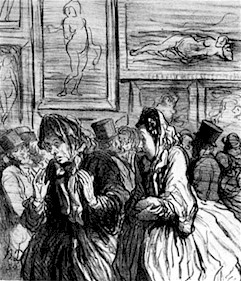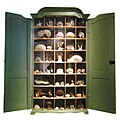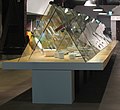Portal:Museums
The Museums Portal
A museum (/mjuːˈziːəm/ mew-ZEE-əm) is an institution dedicated to displaying and/or preserving culturally or scientifically significant objects. Many museums have exhibitions of these objects on public display, and some have private collections that are used by researchers and specialists. Compared to a library, a museum hosts a much wider range of objects and usually focus around a specific theme such as the arts, science, natural history, local history, and other topics. Public museums that host exhibitions and interactive demonstrations are often considered to be tourist attractions, and many museums attract large numbers of visitors from outside their host country, with the most visited museums in the world regularly attracting millions of visitors annually.
Since the establishment of the earliest known museum in ancient times, museums have been associated with academia and the preservation of rare items. Museums originated as private collections of interesting items, and not until much later did the emphasis on educating the public take root. (Full article...)
Selected museum
The Musée d'Orsay (UK: /ˌmjuːzeɪ dɔːrˈseɪ/ MEW-zay dor-SAY, US: /mjuːˈzeɪ -/ mew-ZAY -, French: [myze dɔʁsɛ]) (English: Orsay Museum) is a museum in Paris, France, on the Left Bank of the Seine. It is housed in the former Gare d'Orsay, a Beaux-Arts railway station built between 1898 and 1900. The museum holds mainly French art dating from 1848 to 1914, including paintings, sculptures, furniture, and photography. It houses the largest collection of Impressionist and post-Impressionist masterpieces in the world, by painters including Berthe Morisot, Claude Monet, Édouard Manet, Degas, Renoir, Cézanne, Seurat, Sisley, Gauguin, and van Gogh. Many of these works were held at the Galerie nationale du Jeu de Paume prior to the museum's opening in 1986. It is one of the largest art museums in Europe.
In 2022 the museum had 3.2 million visitors, up from 1.4 million in 2021. It was the sixth-most-visited art museum in the world in 2022, and second-most-visited art museum in France, after the Louvre. (Full article...)
Selected interior image
Selected general article

An art exhibition is traditionally the space in which art objects (in the most general sense) meet an audience. The exhibit is universally understood to be for some temporary period unless, as is occasionally true, it is stated to be a "permanent exhibition". In American English, they may be called "exhibit", "exposition" (the French word) or "show". In UK English, they are always called "exhibitions" or "shows", and an individual item in the show is an "exhibit".
Such expositions may present pictures, drawings, video, sound, installation, performance, interactive art, new media art or sculptures by individual artists, groups of artists or collections of a specific form of art. (Full article...)
Did you know...
- ... that one of the buildings that house the Safe House Museum was where Martin Luther King Jr. hid from the Ku Klux Klan on 21 March 1968, just weeks before he was assassinated?
- ... that before writing The Space Museum, Glyn Jones had never seen Doctor Who?
- ... that the Springfield Science Museum is home to the oldest operating projection planetarium in the United States?
- ... that the Huanaki Cultural Centre & Museum was destroyed by a cyclone?
- ... that a vampire killing kit was donated to the Mercer Museum in the 1980s?
- ... that Ukrainian museum director Horpyna Vatchenko forced the Hermitage Museum to abide by its agreement and return the Kernosovskiy idol after a loan?
Get involved
For editor resources and to collaborate with other editors on improving Wikipedia's Museums-related articles, see WikiProject Museums.
Selected exterior image
Selected type of museum
A national history museum or national historical museum is a history museum dedicated to presenting artifacts and exhibits reflecting the history of a particular nation, usually its home country. The earliest public museums, the Ashmolean Museum in Oxford and the Louvre Museum in Paris, were focused on natural history and art, respectively, and not necessarily on subjects related to the history of any nation. Following Napoleon's use of the Louvre as a center of national pride during his reign, other countries began to use museums not just to store artifacts of aesthetic or educational value, but to portray the country itself in a positive light.
Historically, some national history museums have been used purely as propaganda tools through which governments attempt to convey an official history. For example, "the Nazi regime employed the museum as a deliberate tool of propaganda and 'public education'". It has further been argued that "the very idea of an officially sponsored national history museum is simply outdated" in light of the trend towards pluralistic interpretation of artifacts. On the other hand, it has been argued that: "To create a national history museum that discards unitary national narratives as well as causal trajectories (the teleology of the nation)—in effect to subvert the form—is probably impossible". One concern of national history museums, therefore, is how to fairly and neutrally depict negative periods in a nation's own history. (Full article...)
In the news
- 12 May 2024 –
- Forty-nine Vatican Museums employees start an unprecedented labor dispute over unfair and poor working conditions against the Vatican's Pontifical Commission. (Reuters)
- 6 May 2024 –
- The 2024 Met Gala takes place at the Metropolitan Museum of Art in New York City with the theme "The Garden of Time", celebrating the Met's exhibit Sleeping Beauties: Reawakening Fashion. (Vanity Fair)
Subcategories
Subtopics
Lists
- Museums
- Most visited museums (by region)
- Art museums: most visited, largest
Types
- Art museum
- Agricultural museum
- Archaeology museum
- Architecture museum
- Artillery museum
- Aviation museum
- Biographical museum
- Cabinet of curiosities
- Ceramics museum
- Children's museum
- Community museum
- Computer museum
- Design museum
- Dime museum
- Ecomuseum
- Economuseum
- Ethnographic village
- Farm museum
- Fashion museum
- Folk museum
- Food museum
- Green museum
- Hair museum
- Hall of Memory
- Heritage centre
- Historic house museum
- Human rights museum
- Imaginarium
- Interpretation centre
- Jewish museum
- Lapidarium
- Lighthouse museum
- Living museum
- Local museum
- Maritime museum
- Migration museum
- Mobile museum
- Museum ship
- National history museum
- Natural history museum
- Open-air museum
- Palace museum
- Postal museum
- Prefectural museum
- Print room
- Private museum
- Regimental museum
- Schatzkammer
- Science fiction libraries and museums
- Science museum
- Sex museum
- Sculpture garden
- Technology museum
- Textile museum
- Torture museum
- Toy museum
- Transport museum (list)
- University museum
- Virtual museum
- Wax museum
- Writer's home
Related
Associated Wikimedia
The following Wikimedia Foundation sister projects provide more on this subject:
-
Commons
Free media repository -
Wikibooks
Free textbooks and manuals -
Wikidata
Free knowledge base -
Wikinews
Free-content news -
Wikiquote
Collection of quotations -
Wikisource
Free-content library -
Wikiversity
Free learning tools -
Wiktionary
Dictionary and thesaurus







































































